Taika Waititi’s 2019 film Jojo Rabbit expands society’s collective memory of World War II.
Film, television, memoirs, and novels shape the public understanding of our “collective memory,” which is a “representation of the past shared by members of a group such as a generation or nation-state” (Wertsch 120).
Collective Memory of World War II
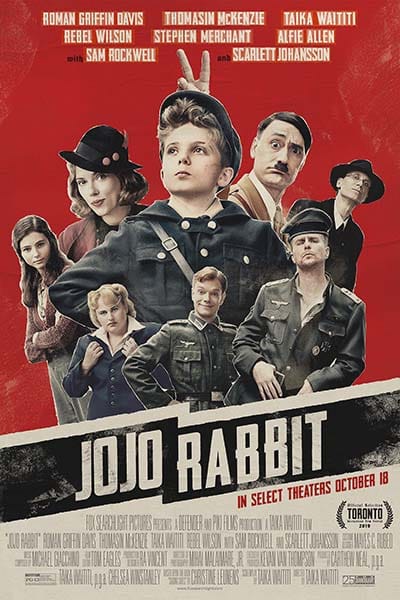
World War II has been depicted numerous times in films like Casablanca (1942), Patton (1970), Schindler’s List (1993), and Dunkirk (2017) shaping America’s collective memory since before the war ended.
There are two World War II stories that are typically told in American cinema; the story of innocent Jewish characters fighting to survive in concentration camps and the story of heroic American soldiers saving Europe.
However, many perspectives of World War II often go overlooked. Understanding diverse perspectives expands our collective memory because, “remembering is shaped by participation in collective life and that different groups generate different accounts of the past” (Wertsch 120).
Expanding the narrative of World War II allows for a better understanding of the past, which can help prepare us for the future.
Taika Waititi’s Jojo Rabbit differs from the typical World War II movie by offering the perspective of a young Nazi boy named Jojo who finds himself caught between his imaginary friend Hitler and his new Jewish friend Elsa.
Not seen it yet? Spoilers ahead! Watch Jojo Rabbit now on Amazon.
Hitler Youth Camp Victims
Throughout the film, Taiki Waititi explores how the Hitler Youth camp brainwashes and manipulates its members by providing a narrative that humanizes Nazis instead of portraying them as cold, apathetic, and evil.
Waititi’s choice to follow a young Nazi makes the Hitler Youth camp feel like a summer camp, which the audience can easily interpret as nonthreatening and maybe even relatable. Captain K, leader of the camp, gives the members a knife. He explains, “You boys have all been issued with your special Deutsches Jungvolk daggers. These are very special and expensive weapons. You should never be without them” (Jojo Rabbit).
The “special” dagger is treated like a participation award or a camp T-shirt. While camp trinkets would make any child feel special, the dagger’s true purpose is revealed as the camp systematically convinces its campers of the serious need to protect themselves from Jews.
Through this, Waititi shows how Nazis were victims of propaganda, brainwashing, and manipulation. It expands our collective memory beyond the Americanized image of Nazi Germany.
Robbing Childhood Innocence
One of the first lessons Jojo learns with the Deutsches Jungvolk is how to kill a live rabbit.
An older Hitler Youth demonstrates, “Place both hands around its neck, and then one hard twist. He might scream, but we’ll just use the boot to finish it off” (Jojo Rabbit). However, when he places the rabbit in Jojo’s hand, Jojo cannot stomach to kill the rabbit and gains his nickname, “Jojo Rabbit.”
Jojo’s empathy towards the rabbit separates him from other representations of Nazis in popular culture that are apathetic and inherently evil. Jojo’s inability to kill the rabbit suggests that apathy is a learned trait. Even though Jojo wants to please the Fuhrer, he still cannot stomach killing the innocent rabbit.
Jojo gets the opportunity to change his antisemitic ideology because he is still young and impressionable, which is why the Nazi Youth camps start at such a young age. Jojo’s mother tells him, “You’re growing up too fast. A ten-year-old shouldn’t be celebrating war and talking politics. You should be climbing trees and then falling out of those trees” (Jojo Rabbit).
Even though Jojo is a Nazi, he is also a victim of Hitler’s regime.
Idolizing Hitler
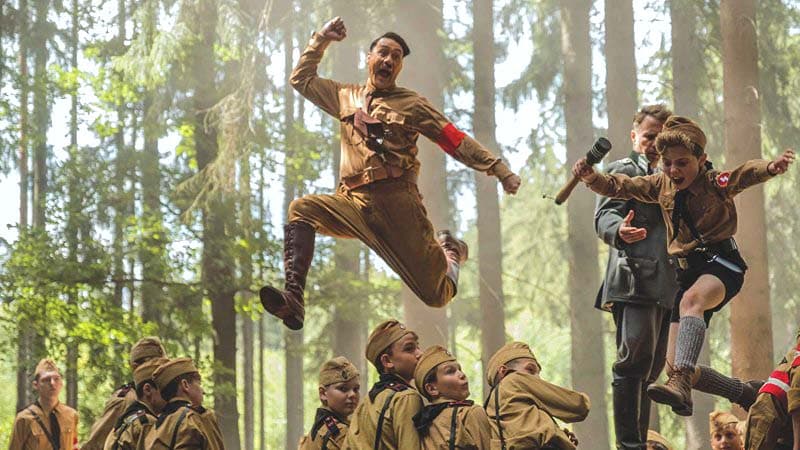
Jojo’s idolization of Hitler is what blinds him to the immorality of Hitler’s ideology.
To Jojo, Hitler is like a celebrity, illustrated by the opening scene where The Beatles play over footage of Hitler and his adoring fans. Jojo’s mother describes Jojo’s dedication, saying, “he’s a fanatic. It took him three weeks to get over the fact that his grandfather was not blond” (Jojo Rabbit). Like crazed Beatles fans hung posters all over their walls, Jojo plasters his walls with Hitler posters.
Upon a glance at Jojo’s room, Captain Deertz of the Gestapo comments, “I wish more of our young boys had your blind fanaticism,” (Jojo Rabbit) illustrating how Nazis preferred blind loyalty to their leader over critical thinking.
Captain Deertz also shows blind fanaticism for Hitler when he exclaims, “You and your friends may have heard a rumor that Hitler only has one ball, this is nonsense. He has four” (Jojo Rabbit). Waititi is referencing famous British propaganda that implied that Hitler only had one testicle. Deertz’s absurd reaction shows that Hitler was viewed as infallible, which helped Hitler promote his ideology.
American films tend to portray all Nazis as being inherently evil when many Germans were indoctrinated into Hitler’s belief system from a young age.
Jewish Rumors & Scapegoating
In the same way Hollywood shapes collective memory of historical events, Hitler used collective memory and the power of narrative to reshape the future.
Waititi primarily shows this through the elaborate prejudices that Jojo and his friends learn at the Hitler Youth camp. However, these prejudices are so farcical that it emphasizes how brainwashed the Nazis are and that prejudice is often irrational.
Fraulein Rahm explains how, “A Jew hypnotized [my uncle] and he became a massive drunk, and a gambler, and he cheated on his wife, and he had an inappropriate relationship with my sister, and then he drowned in an unrelated accident. But it was still the Jew’s fault” (Jojo Rabbit).
Hitler successfully changed the collective memory of Germany to portray Jews as horrendous, evil people. These prejudices came from a limited perspective, which is why it is important to expand collective memory to include as many perspectives as possible.
Since the Nazis were brainwashed and desperate to believe anything that Hitler said, it was easy for him to use Jews as a scapegoat for anything. As soon as Jewish people no longer posed the largest threat to Germany, the same prejudices that once defined Jews went to the Russians.
Yorki explains to Jojo, “[Russians] are worse than anyone. I heard they eat babies and have sex with dogs… the Englishmen do it too. We have to stop them before they eat us and screw all our dogs.”
Once Germany came under attack, the stereotypes once reserved for Jewish people effortlessly shifted to Germany’s new enemy.
Jojo’s Friend Hitler
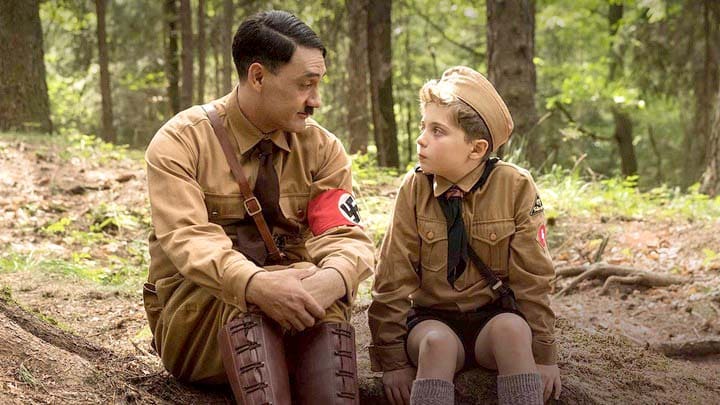
Early in the film, Waititi portrays Hitler as non-threatening, humorous, and supportive.
While there are funny portrayals of Hitler in films like The Producers, these instances feature characters performing as Hitler or do not showcase Hitler’s ideology. While Waititi’s Hitler is Jojo’s imaginary friend, he is still based on the real-life Hitler as Jojo imagines him, meaning he still holds all of Hitler’s beliefs while being the supportive friend that Jojo wants.
Before Jojo’s first day at the Hitler Youth camp, Hitler supportively says, “Sure, you’re a little bit scrawny and a bit unpopular and you can’t tie your shoelaces even though you’re ten years old. But you’re still the bestest most loyal little Nazi I’ve ever met” (Jojo Rabbit).
In America’s collective memory, we often think of Hitler as terrifying, but Waititi reminds us that Hitler was well-known for his speeches and charisma, which helped him rise to power.
Desperate Hitler
However, as Jojo grows closer to Elsa, the Jewish girl hiding in his house, Hitler grows more insecure.
Much like the real Hitler, he is afraid of losing loyalty and support. Hitler knows that if Jojo stops believing in him, if Germany turns on him, he will lose everything. When Jojo first starts hanging out with Elsa, Hitler warns him, “Do not let her put you in a brain prison. That, dear Jojo, is one thing that cannot and must not ever happen to a German! Do not let your German brain be bossed around” (Jojo Rabbit).
Collective memory doesn’t usually recall Germans turning their backs on Hitler. In America’s collective memory, we only recall Americans standing up to Hitler.
When Jojo begins to seriously question Nazi values, we see Hitler become threatening. Instead of supporting Jojo, he gives Jojo an ultimatum, “It is up to you to decide if you want to be remembered, or disappear without a trace, like a pitiful grain of sand into a desert of insignificance. To put it plainly. Get your shit together and sort out your priorities” (Jojo Rabbit).
The more distant Jojo becomes from Nazi values, the angrier and scarier Hitler becomes, proving that Hitler’s support for Jojo was self-serving. Hitler only supported Jojo because Jojo’s goals aligned with Nazi values.
Jojo’s friendship with Elsa exposes Hitler for the antisemitic tyrant that he was. Waititi’s portrayal of Hitler informs our collective memory of how dangerous charismatic, manipulative, influential leaders can be.
Elsa’s Physical Empowerment
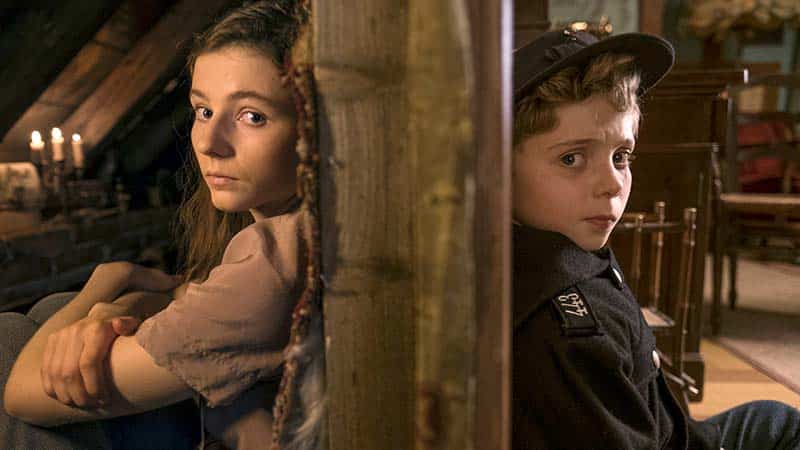
Jojo Rabbit features a strong and active Jewish character.
This broadens our collective memory of Jews during World War II. We typically remember WWII-era Jews as weak due our exposure to holocaust footage. This has greatly affected the portrayal of Jewish characters in film because “the constant circulation of these images for nearly sixty years makes it difficult, if not impossible, to imagine those pathetic bodies as vibrant…” (Lehman and Hunt 158).
Yet Waititi does imagine a vibrant Jewish character who is physical abled. When Jojo first discover Elsa, she runs after Jojo, scaring him away. Jojo threatens her with his Nazi knife, and she overpowers him, taking the knife away.
She then threatens Jojo, “And if you tell [your mom] you know about me. Just one word. I’ll do the world a great big favor and cut your Nazi head off” (Jojo Rabbit).
Elsa overpowers Jojo multiple times throughout the film, showing that she is able bodied. She is fearless and unintimidated by Jojo.
Elsa is Intelligent & Strong
Elsa contrasts the usual depictions we see of Jews in films such as Schindler’s List and The Boy in the Striped Pajamas where Jews are portrayed as frail, weak, and in desperate need of someone to save them.
While it is important to remember the atrocities of the holocaust, these films add to the abundance of “one of the most disseminated images of the Jewish body since World War II [which] has been that of mounds of naked corpses in concentration camps” (Lehman and Hunt 157).
Elsa provides an image of a Jewish girl that is strong and independent. This opens our collective memory to include powerful Jewish women like Elsa.
Elsa is also a unique character because she is depicted as both intelligent and strong. Often in films, the “representation of intelligent Jews supports the notion that Jewish superior intelligence compensates for Jewish physical weakness” (162).
Waititi addresses this stereotype when Jojo calls Elsa weak and she responds by physically overtaking him. She defends herself by declaring, “Break free, great Aryan. There are no weak Jews. I am descended from those who wrestle angels and kill giants. We were chosen by God. You were chosen by pathetic little men who can’t even grow a full mustache” (Jojo Rabbit).
Elsa presents Jewish strength as fact because she associates the Jewish identity with strength rather than suffering. Our collective memory often overlooks the strength it took for someone like Elsa to survive.
Elsa Controls the Narrative
A relationship between Elsa and Jojo forms when Jojo decides to write a book about Jewish people to help Nazis identify them.
Jojo interviews Elsa about her heritage, which she takes as an opportunity to take control of the Jewish narrative. She describes, “In the beginning, we used to live in caves, deep, deep in the center of the earth… scary places, full of strange and wonderful creatures, all with one thing in common… the love of art” (Jojo Rabbit).
Initially, Elsa takes Jojo’s preconceived prejudices and further fabricates them, poking fun at his ridiculous beliefs. However, she eventually turns the narrative into an elegant fairytale and even produces drawings for Jojo’s book. When Elsa is fabricating negative or positive Jewish characteristics, she is in control. And she uses these fabrications to her advantage. Either manipulating Jojo to fear her or to show Jojo her perspective.
In fact, it is because of Elsa’s ability to relate to Jojo that she can dispel Jojo’s Nazi fanaticism. She says, “You’re not a Nazi, Jojo. You’re a 10-year-old kid, who likes swastikas and likes dressing up in a funny uniform and wants to be part of a club. But you’re not one of them” (Jojo Rabbit).
Not only does Elsa control her own narrative, but she greatly influences Jojo’s character arch. By exposing Jojo’s desperation for belonging, she is taking control of his narrative and thus the plot of the entire film. Unlike America’s typical collective memory of Jews during World War II, Elsa is not rescued by an American soldier. But rather she saves the protagonist by changing his perspective, and in doing so, saves herself.
Captain K & Homosexuality
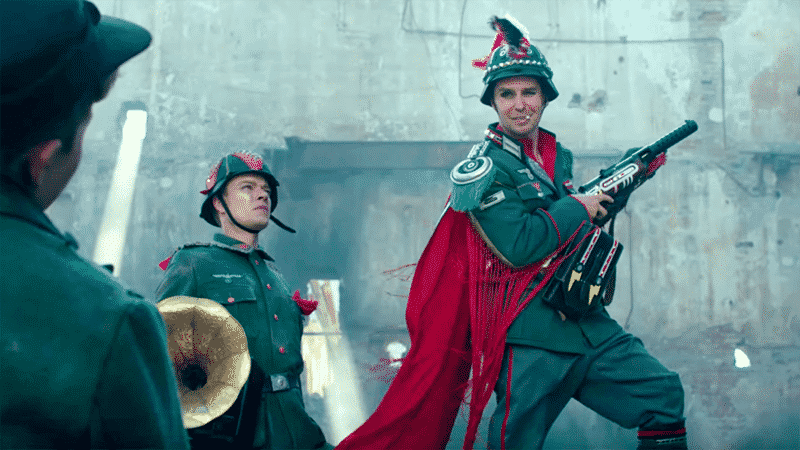
Americans often forget that Jews were not the only minority group that was persecuted by Hitler. Hitler also forced blacks, homosexuals, communists, gypsies, and disabled people into concentration camps.
Waititi doesn’t go in depth about the persecution of other minorities. However, he does include an active gay character, which is nearly unheard of in other World War II films. Captain K’s homosexuality is implied throughout the film. For instance, when he designs his uniform, he says, “As part of our preparations for the invasion, I’m redesigning my uniform. Got the feathers for air dynamics. The sparkly color to dazzle the enemy. The boots, purely decorative” (Jojo Rabbit).
There also seems to be an apparent relationship between Captain K and his subordinate, Finkle, portrayed through many suggestive glances.
Not only is Captain K gay, but he is also an active character who greatly influences the plot of the film.
For instance, Captain K saves Elsa when Jojo’s home is inspected by the Gestapo. He also saves Jojo’s life by taking off Jojo’s Nazi uniform and calling Jojo a Jew so he wouldn’t be killed by the Russians.
Further Expansion of World War II Collective Memory
While Taika Waititi’s Jojo Rabbit adds to our collective memory and enables us to explore different perspective of World War II, there are still many aspects about World War II that, as a society, we have yet to explore.
It is our job as citizens of the world to educate ourselves on historical events.
There is always more than one side to a story. In order to learn from the past, it’s important to update our collective memory to remember events in their entirety.
Works Cited: Collective Memory & Jojo Rabbit
Jojo Rabbit. Directed by Taika Waititi, performances by Roman Griffin Davis, Taika Waititi, Scarlett Johansson, Thomasin McKenzie, Sam Rockwell, Rebel Wilson, Stephen Merchant, and Alfie Allen, Fox Searchlight Pictures, 2019.
Peter Leham and Susan Hunt. “The Naked and the Dead.” The Persistence of Whiteness, edited by Daniel Bernardi, 2008, 157-164.
Wertsch, James V. “The Narrative Organization of Collective Memory.” Ethos, vol. 36, no. 1, 2008, pp. 120–135. JSTOR, www.jstor.org/stable/20486564. Accessed 2 Mar. 2020.